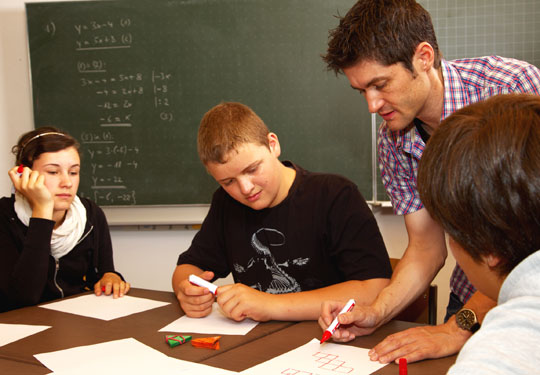Mindset for Math
Freiburg, May 09, 2017
What makes a good instructor? The doctoral student Mona Weinhuber from the Department of Educational Science did an experiment with teachers and students. The result? The ability to explain facts is not dependent alone on the individual's expertise.
 Mathematics at school is often viewed as a toolbox full of formulas that are supposed to be taught according to step-by-step instructions. This approach can prevent teachers from explaining things well, says Mona Weinhuber.
Mathematics at school is often viewed as a toolbox full of formulas that are supposed to be taught according to step-by-step instructions. This approach can prevent teachers from explaining things well, says Mona Weinhuber.
Photo: Woodapple/Fotolia
Researchers explain better than teachers. Freiburg scientists discovered this truth several years ago. They guessed the reason was they had more pronounced and better overlapping knowledge in their field. But is the level of knowledge really the deciding factor for more successful explanations that enhance learning?
If you ask students what makes a good teacher, they will say it is someone who can explain things well. „That is a teacher's basic skill, but it is also something whose many aspects have been neglected in the research," reports doctoral student Mona Weinhuber from the Department of Educational Sciences at the University of Freiburg. She is focusing on how upper grade high school math teachers introduce new material. And she questions whether it is really their expertise in the subject that makes the difference. „I don't think so," she says: „That the scientists in the study were able to explain better may have to do with the fact that they had an entirely different mindset than teachers do."
For Weinhuber the word „mindset" means the expectations someone has about his or her own subject area. They can vary greatly. Mathematics at school, for instance, is often viewed as something very static: there is a toolbox full of formulas that you can use according to certain rules and step-by-step instructions like a recipe.
The other extreme is the dynamic mathematics found in science. It serves first and foremost as the basis for argumentation and for solving problems. „A lot of students have to get used to a whole new kind of mathematics in their first few semesters," states Weinhuber, explaining the different instructional cultures at the University and at school. According to Weinhuber's theory, you formulate explanations in different ways, depending on the context.
Cartoon for context
Weinhuber is therefore examining whether the context and associated mindset are responsible for the quality of the explanations given. Her test subjects, teachers and university students, should write an introduction to the subject „Extreme Values with Constraints." Then they are required to take a math and teaching methodology test. The special part: Before the test subjects got their assignments, they read a cartoon in one of two possible variations.
It dealt with a homework discussion in the classroom. The only difference was the conversation's wording. For one part of the test subjects, the cartoon was meant to suggest the school-based mindset of „math as a recipe". In this variation, the class discussed the individual steps of the solution. With the other test subjects, Weinhuber tried to activate the university mindset of „math as argumentation." In the second cartoon variation the students discussed the different approaches to the solution.
„Knowledge and action are always situation-based. Using the comics, I am able to bring people into a certain context – and that can stimulate certain mindsets in their heads," explains Weinhuber.
The results show that her intuition was right: The test subjects that were placed in the argumentation context wrote more learning-enhancing explanations than those who remained in the cooking recipe context that are customary in school environments.
„I was able to show that teachers do indeed have the expertise to explain things conducive to knowledge transfer – it is just that they don't do it." The conclusion drawn from her study is that people need to rethink the culture of school instruction: „We have to overcome the notion in high school education today that mathematics is merely a cooking recipe. "
Weinhuber's project is part of the Freiburg Advanced Center of Education (FACE), a cooperation between the University and the University of Education, Freiburg. One of the goals that FACE has is the development of a new course of study, Master of Education, which will soon replace the old teacher training program. Weinhuber's study results will be an immediate part of it. „Still lecturing, or are you explaining now?" („Trägst du noch vor, oder erklärst du schon?") is the title of the seminar she will be giving this coming winter semester. In the seminar, Weinhuber will present to future teachers the latest scientific discoveries relating to the topic – for instance that activating certain mindsets are decisive in developing explanations that are conducive to knowledge transfer.
Sarah Schwarzkopf

